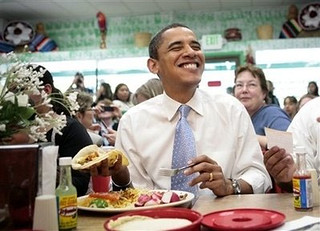 |
| (Photo credit: mediajorgenyc) |
It worked perfectly. If the U.S. had not won World War 2, Midway would never have existed in Japanese history. The average man of course read nothing in the papers, heard nothing on the radio, saw nothing in the newsreel. But perceptive Japanese “felt” something momentous had happened though they could not identify its cause. It’s impact, though denied in the press, shuddered through the whole imperial fabric. From that day forward events seemed to take a downward trajectory. Only after the war did the Japanese know the root of their misfortunes.
Midway.
But the loss was worse than four carriers sunk. Jonathan Parshall and Anthony Tully, in their classic account of Midway, The Shattered Sword, argued that the battle broke the Japanese empire in a fundamental way. It was the consequences of denial that really finished the Japanese military:
Cohen and Gooch propose that all military failures fall into three basic categories: failure to learn from the past, failure to anticipate what the future may bring, and failure to adapt to the immediate circumstances on the battlefield. They further note that when one of these three basic failures occurs in isolation (known as a simple failure), the results, while unpleasant, can often also be overcome. Aggregate failures occur when two of the basic failure types, usually learning and anticipation, take place simultaneously, and these are more difficult to surmount. Finally, at the apex of failure stand those rare events when all three basic failures occur simultaneously-an event known as catastrophic failure. In such an occurrence, the result is usually a disaster of such scope that recovery is impossible.The Japanese did not want to accept what Midway meant about their strategic assumptions and therefore they suppressed it. That was more damaging than the naval losses themselves. It was that failure to adjust to reality which doomed the empire.
The curious thing about September 11, 2012 — the day of the Benghazhi attack — is that for some reason it marks the decline of the Obama presidency as clearly as a milepost. We are told by the papers that nothing much happened on that day. A riot in a far-away country. A few people killed. And yet … it may be coincidental, but from that day the administration’s foreign policy seemed inexplicably hexed. The Arab Spring ground to a halt. The secretary of State “resigned.” The CIA director was cast out in disgrace. Not long after, Obama had to withdraw his red line in Syria. Al-Qaeda, whose eulogy he had pronounced, appeared with disturbing force throughout Africa, South Asia and the Arabian Peninsula. Almost as if on cue, Russia made an unexpected return to the world stage, first in Syria, then in the Iranian nuclear negotiations.
Worse was to follow. America’s premier intelligence organization, the National Security Agency, was taken apart in public and the man who took its secrets, Edward Snowden, decamped to Moscow with a laptop full of secrets. But it was all just a curtain raiser to the dismemberment of Ukraine and the disaster in Eastern Europe:
Ninety percent of voters in a key industrial region in eastern Ukraine came out in favor of sovereignty Sunday, pro-Russian insurgents said in announcing preliminary results of a twin referendum that is certain to deepen the turmoil in the country.The Ukraine has now been effectively partitioned. The Obama administration talk about inflicting “consequences” and “costs” on Russia turned out to be empty. Almost as if to add insult to injury, Iran has declared victory in Syria over Obama. “‘We have won in Syria,’ said Alaeddin Borujerdi, chairman of the Iranian parliament’s national security and foreign policy committee and an influential government insider. ‘The regime will stay. The Americans have lost it.’”
Roman Lyagin, election chief of the self-styled Donetsk People’s Republic, said around 75 percent of the Donetsk region’s 3 million or so eligible voters cast ballots, and the vast majority backed self-rule.
And still there’s no acknowledgement of anything being fundamentally wrong.
Read the rest of this article:
Belmont Club » The Day Obama’s Presidency Died
No comments:
Post a Comment